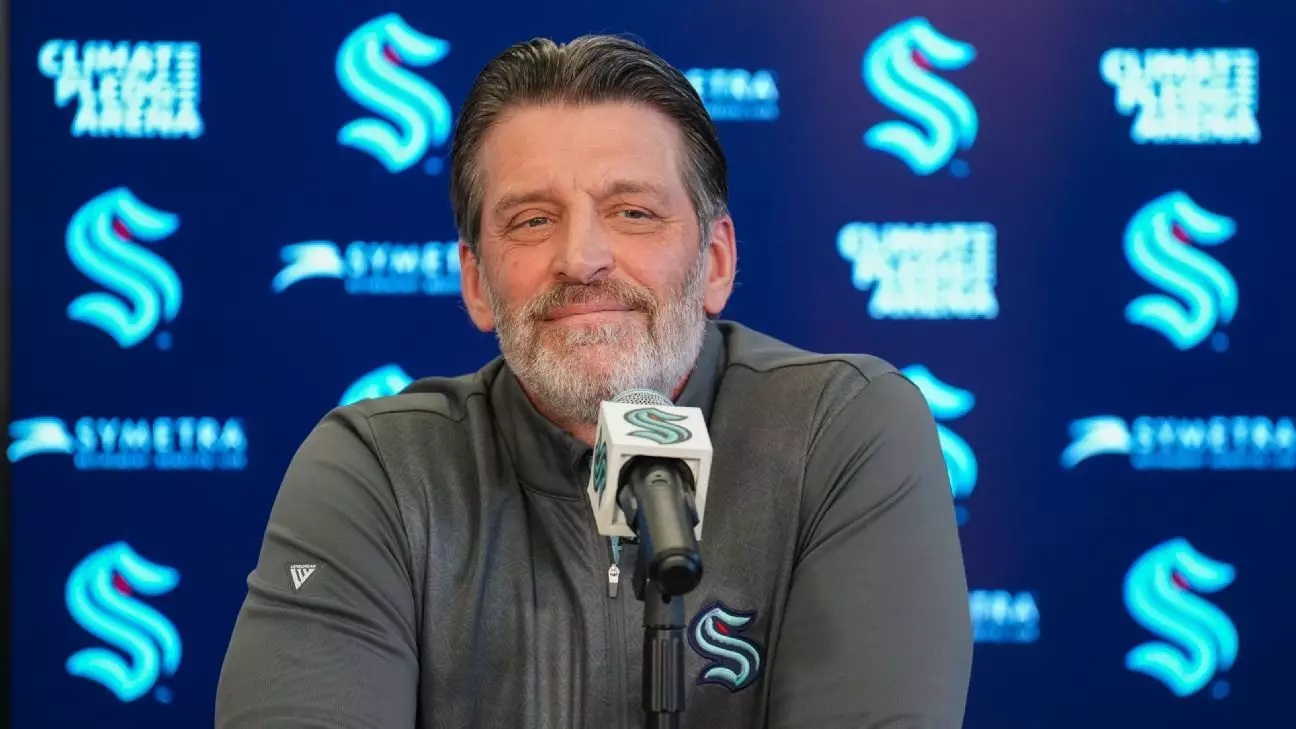Lane Lambert, newly appointed head coach of the Seattle Kraken, stands at the intersection of expectation and opportunity as he embarks on a pivotal journey to reshape the franchise into a playoff contender. Introduced officially at a press conference held at the team’s practice facility, Lambert made it abundantly clear that he feels no external pressure—a concept that might seem counterintuitive in the high-stakes world of professional sports. However, it’s his self-imposed expectation to elevate the Kraken that strikes a more profound chord. At 60 years old, he embodies the balance of experience and aspiration, and he seems ready to harness both to initiate the team’s transformation.
This duality of pressure, both internal and external, sets Lambert apart. While he may dismiss the weight of public expectation, the reality is that as he takes the helm of an organization that has made the playoffs only once in its four-year existence, the spotlight will be unyielding. His journey begins with a firm belief in self-efficacy: “You start on Day 1,” he emphasizes. While he acknowledges that improvement is a process—a journey—it is the specifics of this journey that merit closer scrutiny.
Analyzing the Kraken’s Shortcomings
In his first address, Lambert did not shy away from admitting the shortcomings under the previous regime, particularly highlighting their dismal performance metrics. A franchise that finished with a record of 35-41-6 last season clearly has much room for improvement. The Kraken ranked in the bottom third of the league for pivotal statistics such as power play efficiency (23rd), faceoff winning percentage (24th), and effective shooting (25th). Moreover, their penalty kill was also lackluster, landing them at 21st in the league.
Faced with an array of operational challenges, Lambert must analyze not just the surface-level problems, but also the underlying issues that led to the team’s inability to capitalize on opportunities. It’s evident that the Kraken, under the previous leadership, lacked the gumption and adaptability to create an effective game strategy aligned with the strengths of the players. Lambert’s task is not just about improving the statistics; it’s about reshaping the team’s culture and empowering players to reach their potential.
The Value of Experience and Reflection
A key component of Lambert’s philosophy appears to revolve around the lessons learned from his past. Reflecting on his most recent coaching experience—a tumultuous but enlightening tenure with the New York Islanders—he exhibits a level of introspection that is commendable. Getting fired is seldom viewed as a positive experience, but for Lambert, it sparked a crucial period of reflection. He openly discusses the importance of humility and adaptation, skills that are vital in a sport as fluid as hockey.
His prior experience as an assistant coach with recognized organizations—like the Nashville Predators and Washington Capitals, where he contributed to their 2018 Stanley Cup triumph—endows him with a sporting pedigree that gives him the authority to lead. Lambert’s diverse experiences across various teams could be the secret sauce the Kraken need to cultivate a winning mindset.
Cultivating Talent: A Balanced Roster
As Lambert embarks on his mission to revitalize the Kraken, he will be working with a roster that, surprisingly, has both strong veterans and promising young talent. Players like Jaden Schwartz, Jared McCann, Eeli Tolvanen, and Chandler Stephenson provide a foundation of experience, which is necessary during challenging times. Meanwhile, the contributions of rising stars such as Matty Beniers, the 2023 Rookie of the Year, and Shane Wright injects youthful exuberance and skill into the mix.
Lambert seems keenly aware of the dynamic balance required to foster both veteran influence and youthful energy. It is this kind of foresight that could lead to an authentic team chemistry, which is often overlooked but critical for a franchise looking to rise from the ashes of mediocrity. By supporting this blend of experience and ambition, Lambert can sculpt a team that is cohesive and competitive, reflecting his own coaching philosophy grounded in mutual respect and growth.
An Optimistic Outlook
While the landscape ahead is filled with challenges, the optimism stemming from Lambert’s approach is palpable. His belief that “if you do the right things every day and look to get better,” ultimately resonates with the essence of professional sports. The Kraken’s fate may depend less on the magic wand of immediate success and more on Lambert’s commitment to meticulous improvement and sustained effort. If Lambert can successfully implement his systems and instill a winning mentality, the Seattle Kraken may very well transcend their past disappointments and carve out a new identity in the NHL.

